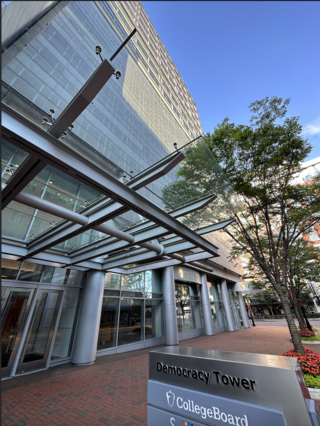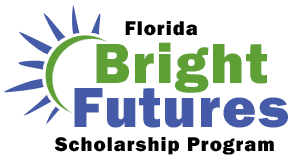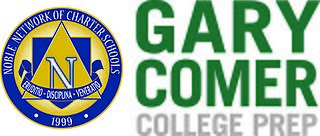Related Research Articles
The Preliminary SAT/National Merit Scholarship Qualifying Test (PSAT/NMSQT) is a standardized test administered by the College Board and cosponsored by the National Merit Scholarship Corporation (NMSC) in the United States. In the 2018–2019 school year, 2.27 million high school sophomores and 1.74 million high school juniors took the PSAT. Scores from the PSAT/NMSQT are used to determine eligibility and qualification for the National Merit Scholarship Program.

The College Board is an American not-for-profit organization that was formed in December 1899 as the College Entrance Examination Board (CEEB) to expand access to higher education. While the College Board is not an association of colleges, it runs a membership association of institutions, including over 6,000 schools, colleges, universities, and other educational organizations.

Bright Futures is a scholarship program in the state of Florida. It is funded by the Florida Lottery and was first started in 1997.

The University of Puerto Rico, Humacao is a public college in Humacao, Puerto Rico. It is part of the University of Puerto Rico. Its campus is home to the UPRH Astronomical Observatory and the college graduates more majors in chemistry, physics, and mathematics than any other higher education institution on the island. UPRH has been accredited by the Middle States Commission on Higher Education (MSCHE) since 1965.

The National Merit Scholarship Program is a United States academic scholarship competition for recognition and university scholarships. The program is managed by the National Merit Scholarship Corporation (NMSC), a privately funded not-for-profit organization based in Evanston, Illinois. The program began in 1955.

The United States Presidential Scholars Program is a program of the United States Department of Education. It is described as "one of the nation's highest honors for high school students" in the United States of America.

La Unidad Latina, Lambda Upsilon Lambda Fraternity, Inc. is a Latino-based collegiate fraternity. It was founded at Cornell University in Ithaca, New York on February 19, 1982, and has 75 active undergraduate chapters and fifteen graduate alumni professional chapters in universities and cities across the United States.
Latino studies is an academic discipline which studies the experience of people of Latin American ancestry in the United States. Closely related to other ethnic studies disciplines such as African-American studies, Asian American studies, and Native American studies, Latino studies critically examines the history, culture, politics, issues, sociology, spirituality (Indigenous) and experiences of Latino people. Drawing from numerous disciplines such as sociology, history, literature, political science, religious studies and gender studies, Latino studies scholars consider a variety of perspectives and employ diverse analytical tools in their work.

Flower Mound High School (FMHS) is part of Lewisville Independent School District and is located in Flower Mound, Texas, United States. The school rests on 52 acres (21 ha) of land that was purchased in 1993. FMHS was the second high school built in Flower Mound, after Edward S. Marcus High School. With the expansion of the town in the 1980s and 1990s, a second high school was built to accommodate the growth. FMHS has been called one of the top 10 best public high schools in the Dallas area and had received an "Exemplary" (highest) rating from the Texas Education Agency. The school's fight song is the Michigan Wolverines' fight song, "The Victors".

The National Hispanic Institute (NHI) is an international nonprofit organization dedicated to serving the future leadership needs of the global Hispanic community. Founded in 1979 in the State of Texas with the mission of serving the future leadership needs of the United States via the Hispanic/Latino community, NHI became the largest Latino youth organization in the United States. NHI is now an international organization with over 85,000 alumni worldwide and a well-known consortium of notable colleges and universities.

FSU Young Scholars Program (YSP) is a six-week residential science and mathematics summer program for 40 high school students from Florida, USA, with significant potential for careers in the fields of science, technology, engineering and mathematics. The program was developed in 1983 and is currently administered by the Office of Science Teaching Activities in the College of Arts and Sciences at Florida State University (FSU).
Angelo Falcón was a Puerto Rican political scientist best known for starting the Institute for Puerto Rican Policy (IPR) in New York City in the early 1980s, a nonprofit and nonpartisan policy center that focuses on Latino issues in the United States. It is now known as the National Institute for Latino Policy and Falcón served as its president until his death. He was also an Adjunct Assistant Professor at the Columbia University School of Public and International Affairs (S.I.P.A.).

A Hispanic-serving institution (HSI) is defined in U.S. federal law as an accredited, degree-granting, public or private nonprofit institution of higher education with 25% or higher total undergraduate Hispanic or Latino full-time equivalent (FTE) student enrollment. In the 2021–22 academic year, 572 institutions met the federal criteria, up from 539 institutions in the 2018–19 academic year.
The English Language Proficiency Test (ELPT) was the name of a SAT II last administered in January 2005. It was a one-hour multiple choice test given on English language proficiency by The College Board. A student whose native language was not English could have chosen to take this test instead of or in addition to Test of English as a Foreign Language (TOEFL) for college entrance depending upon requirements of the schools in which the student was planning to apply. Until 1994, the SAT II's were known as Achievement Tests. The ELPT assessed both the understanding of spoken and written standard American English and the ability to function in a classroom where English is spoken. The test was intended for students whose best language was not English; who attend U.S. high schools, or who had studied in an international school where courses were taught in English; had completed two to four years of English language instruction in an English as a Second Language program or in English enrichment courses; and/or students who spoke a language other than English at home or work. It was scored on a scale of 901 to 999
Johnston Senior High School (JHS) is a public high school located in Johnston, Rhode Island, United States. It is part of the Johnston Public School System and has approximately 900 students in grades 9 through 12. The school colors are Columbia blue and white and the school mascot is the Panther. In 2005, JHS was named a Rhode Island Department of Education Regents' Commended School. The 2018–2019 school year principal is Dennis Morrell; assistant principals are Michael Mancieri and Donna Pennacchia.

Gary Comer College Prep is a Level 1 public grade nine through twelve charter high school located in Chicago, Illinois' Greater Grand Crossing neighborhood. It is a part of the Noble Network of Charter Schools. It is named after the Gary Comer, the founder of Lands' End and philanthropic entrepreneur. Gary Comer founded the Comer Youth Center in 2006, with Gary Comer College Prep opening its doors in 2008, serving grades nine through twelve. In 2011, the Gary Comer College Prep Middle School opened creating two campuses under one school, serving grades six through twelve. Prior to becoming the principal of GCCP, Ms. Kelly founded Gary Comer College Prep Middle School in 2011 and served as the principal there for four years. Before joining Noble, Ms. Kelly served as the Principal of KIPP Indianapolis College Prep, a 5-8 middle school located in the inner-city of Indianapolis, IN.

The Inter American University of Puerto Rico, Faculty of Law is the school of law of the Inter American University of Puerto Rico, a private co-educational corporation accredited by the Middle States Association of Colleges and Schools, the Puerto Rico Council of Higher Education, and the Commonwealth of Puerto Rico Department of Education. The School of Law is approved by the American Bar Association (ABA) and is located in San Juan, the capital city of Puerto Rico. Since its founding, the School of Law has succeeded in meeting the needs of the legal profession, in particular, and Puerto Rico's society in general.
Antonio Pérez López was appointed in 1995 as president of Borough of Manhattan Community College (BMCC), The City University of New York (CUNY) which has grown since that time to have the highest enrollment of any CUNY college. President Pérez stepped down in 2018.

Félix V. Matos Rodríguez is a Puerto Rican academic administrator, currently the eighth Chancellor of The City University of New York (CUNY), the largest urban public university system in the United States. A historian, professor, author and noted Puerto Rican scholar, Matos Rodríguez previously served as president of two CUNY colleges and as a cabinet secretary of the Puerto Rico Department of Family Affairs. He assumed the post of Chancellor of CUNY on May 1, 2019, becoming the first Hispanic to lead the university.

F. Chris Garcia is an educator, scholar, researcher, author, public opinion pollster and higher education administrator. From 2002-2003, he served as the president of University of New Mexico. Garcia was the first native New Mexican Hispanic to serve as a college dean, academic vice-president and president at the University of New Mexico.
References
- ↑ National Hispanic Recognition Program website
- ↑ National Hispanic Recognition Program website
- ↑ National Hispanic Recognition Program website
- ↑ "National Scholar". 7 April 2015.
- ↑ "National Hispanic Scholars". 17 September 2019.
- ↑ "Fall 2022 Freshmen | UK Student Financial Aid and Scholarships".
- ↑ "HSF: Student".